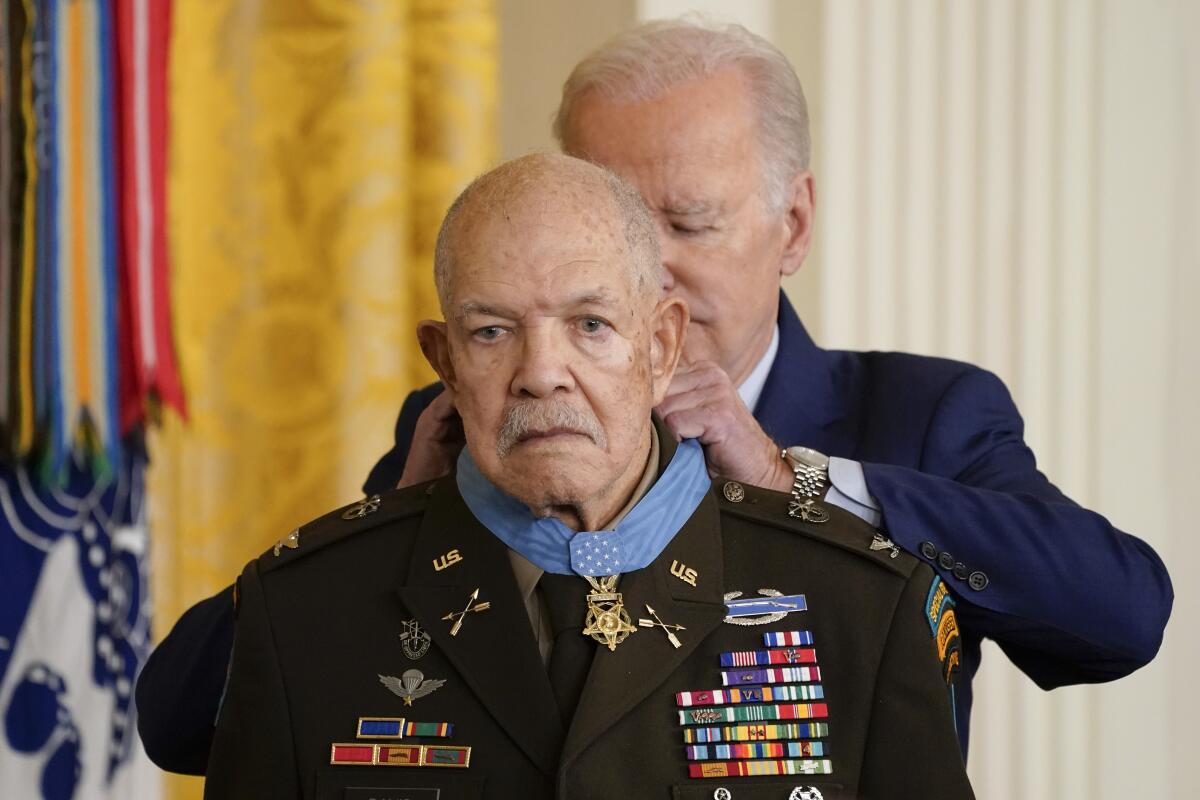Black Vietnam veteran awarded Medal of Honor after decades-long wait

- Share via
WASHINGTON — Nearly 60 years after he was recommended for the nation’s highest military award, retired Army Col. Paris Davis, one of the first Black officers to lead a Special Forces team in combat, received the Medal of Honor on Friday for his bravery in the Vietnam War.
At a crowded White House ceremony, Davis emphasized the positive of the honor rather than negative of the delay, saying: “It is in the best interests of America that we do things like this.”
Thanking President Biden, who draped a ribbon with the medal around his neck, he said, “God bless you, God bless all, God bless America.”
The belated recognition for the 83-year-old Virginia resident came after the recommendation for his medal was lost, resubmitted — and then lost again.
It wasn’t until 2016 — half a century after Davis risked his life to save some of his men under fire — that advocates re-created and resubmitted the paperwork.
As tech companies and others slash tens of thousands of jobs, firms are also rethinking new hires and rescinding job offers, upending lives.
Biden described Davis as a “true hero” for risking his life amid heavy enemy fire to haul injured soldiers under his command to safety. When a superior ordered him to safety, according to Biden, Davis replied: “Sir, I’m just not going to leave. I still have an American out there.” He went back into the firefight to retrieve an injured medic.
“You are everything this medal means,” Biden told Davis. “You’re everything our nation is at our best. Brave and big-hearted, determined and devoted, selfless and steadfast.”
Biden said Davis should have received the honor years ago, describing segregation in the United States when he returned home and questioning the delay in awarding him the medal.
“Somehow the paperwork was never processed,” Biden said. “Not just once. But twice.”
Davis doesn’t dwell on the delayed honor and says he doesn’t know why decades had to pass before it finally arrived.
“Right now I’m overwhelmed,” he told the Associated Press in an interview Thursday, the eve of the medal ceremony.
“When you’re fighting, you’re not thinking about this moment,” Davis said. “You’re just trying to get through that moment.”
“That moment” stretched over nearly 19 hours and two days in mid-June 1965.
Davis, then a captain and commander with the 5th Special Forces Group, engaged in nearly continuous combat during a predawn raid on a North Vietnamese army camp in the village of Bong Son in Binh Dinh province.
He engaged in hand-to-hand combat with the North Vietnamese, called for precision artillery fire and thwarted the capture of three American soldiers — all while suffering wounds from gunshots and grenade fragments. He used his pinkie finger to fire his rifle after his hand was shattered by an enemy grenade, according to reports.
Davis repeatedly sprinted into an open rice paddy to rescue members of his team, according to the ArmyTimes. His entire team survived.
“That word ‘gallantry’ is not much used these days,” Biden said. “But I can think of no better word to describe Paris.”
Davis, from Cleveland, retired in 1985 at the rank of lieutenant colonel and now lives in Alexandria, Va., just outside Washington. Biden called him several weeks ago to deliver the news.
Davis says the wait in no way lessens the honor.
“It heightens the thing, if you’ve got to wait that long,” he said.
Davis’ commanding officer recommended him for the military’s top honor, but the paperwork disappeared.
He was awarded a Silver Star, the military’s third-highest combat medal, but members of Davis’ team have argued that his skin color was a factor in the disappearance of his Medal of Honor recommendation.
“I believe that someone purposely lost the paperwork,” Ron Deis, a junior member of Davis’ team in Bong Son, told the AP in a separate interview.
Deis, 79, helped compile the recommendation that was submitted in 2016. He said he knew Davis had been recommended for the Medal of Honor shortly after the battle in 1965, and he spent years wondering why Davis hadn’t been awarded the medal. Nine years ago he learned that a second nomination had been submitted “and that also was somehow, quote, ‘lost.’”
“But I don’t believe they were lost,” Deis said. “I believe they were intentionally discarded. They were discarded because he was Black, and that’s the only conclusion that I can come to.”
Army officials say there is no evidence of racism in Davis’ case.
“We’re here to celebrate the fact that he got the award, long time coming,” Maj. Gen. Patrick Roberson, deputy commanding general of the U.S. Army Special Operations Command, told the AP.
“We, the Army, you know, we haven’t been able to see anything that would say, ‘Hey, this is racism.’”
“We can’t know that,” Roberson said.
In early 2021, Christopher Miller, then the acting Defense secretary, ordered an expedited review of Davis’ case. He argued in an opinion column that awarding Davis the Medal of Honor would address an injustice.
“Some issues in our nation rise above partisanship,” Miller wrote. “The Davis case meets that standard.”
Davis’ daughter, Regan Davis Hopper, a mother of two teenage sons, told the AP that she only learned of her father’s heroism in 2019. Like him, she said she tries not to dwell on her disappointment in how the situation was handled.
“I try not to think about that. I try not to let that weigh me down and make me lose the thrill and excitement of the moment,” Hopper said. “I think that’s most important, to just look ahead and think about how exciting it is for America to meet my dad for the first time. I’m just proud of him.”
More to Read
Sign up for Essential California
The most important California stories and recommendations in your inbox every morning.
You may occasionally receive promotional content from the Los Angeles Times.











